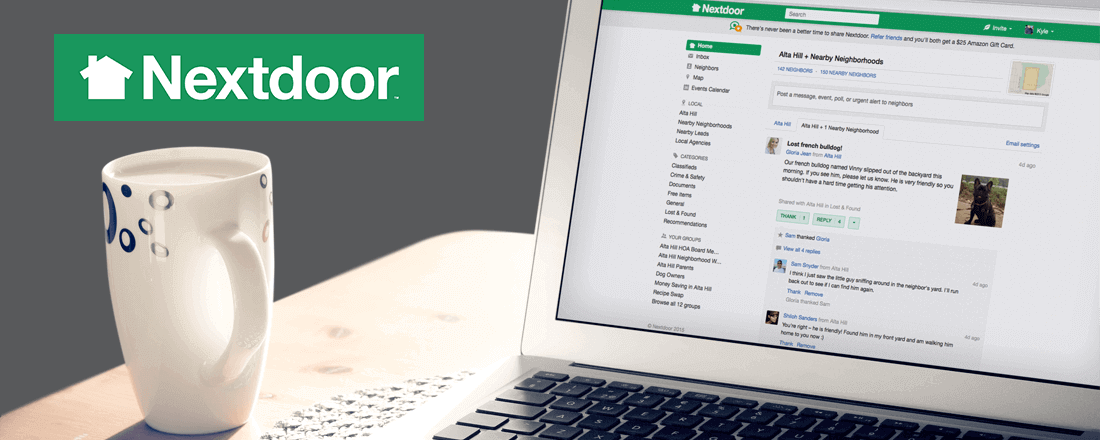
At a time when 50 percent of Facebook users have more than 200 virtual friends, and the average Twitter user has nearly 350 followers, Pew Research Center data reveals 29 percent of Americans only know a few of their actual neighbors. Even more worrisome, 28 percent don’t know any of them at all. And because it’s hard to have confidence in strangers, it’s no wonder nearly half say they don’t trust the other people who live in their neighborhood.
Fortunately, Nextdoor was designed to change this dynamic. RewardExpert sat down with the private social network’s Director of Public Affairs, Jennifer Mayfield, to learn more about its inspiration, how it works, and how frequent travelers—or even homebodies—can use it to build community relationships and stay up-to-date on everything happening in their neighborhood.

Restoring a Sense of Community
Founded by Nirav Tolia and Sarah Leary in 2010, Nextdoor was inspired by their desire to bring a sense of community back into our hectic, often disconnected world.
“Our founders have a deep sense of community coming from their childhoods,” Mayfield explained. “They had seen some data that basically showed that people just don’t know their neighbors anymore, and they wanted to help them return to the days where you could go to your neighbor for a cup of sugar.”
Since its launch, the private social network has grown to include more than 126,000 neighborhoods in the U.S. “We’re in all 50 states,” Mayfield continued. “That basically equates to about 70 percent of U.S. neighborhoods, with hundreds of new ones joining the platform daily.”
Nextdoor recently began a global expansion as well, adding neighborhoods in the U.K. and Netherlands in 2016. “We’ll be expanding into Western Europe very soon,” she said.
Private, Secure and Safe
As a U.S. homeowner or renter, joining Nextdoor is simple.
“You basically just need to go to Nextdoor.com and enter your name and address,” Mayfield said. “You will then find out if a neighborhood already exists in your area. If yours is not yet part of the platform, you can add it—provided you can bring 10 other people on board. It’s a relatively easy process, and the website will walk you through it.”
Because the platform is private, your address will be verified before you join. “You have to be able to prove that you live in the house,” Mayfield added. “For most people, it’s a two-step process in which you will enter your name and address into the website and then wait to receive a paper postcard with a verification code. Once you enter that code, you’re able to join the neighborhood. This is a feature that is really unique to Nextdoor and enables us to ensure that no one is trolling the site. It also keeps the activity on the site private, secure and safe for residents.”

From Buying and Selling to Saving Lives
Mayfield said neighbors are utilizing Nextdoor to interact with each other in a variety of ways from buying and selling unwanted items to sharing recommendations and more.
“Classifieds are a big category,” Mayfield said. “There are also small businesses starting to use it to target hyper-local clientele. But what has been most profound about the site is the do-gooder stuff. Our tagline is ‘good things happen when neighbors start talking,’ and we all really believe that. Recently, we had a woman who was in desperate need of a liver transplant but hadn’t been able to find a match. She posted her story on Nextdoor and one of her neighbors ended up donating part of her liver, saving this woman’s life.”
Frequent travelers, in particular, will benefit from the neighborhood watch aspect of Nextdoor. “It’s really good when you’re traveling to be able to keep an eye on your house and what’s happening in your neighborhood,” Mayfield added. “There’s a ton of data out there that basically shows that there is no better way to protect your home than to know your neighbors.”
Nextdoor’s blog contains many examples of neighbors banding together to catch serial home burglars, prevent car break-ins, deal with natural disasters, and find lost pets.
“One of my colleagues saw that a neighbor had left his garage door open,” Mayfield said. “He emailed the guy through Nextdoor and found out his neighbor was at the airport, leaving for a trip. He was able to shut the garage door for him. I hear across the board, time and time again, that people really love Nextdoor because they know their neighbors will look out for their home while they are gone.”
